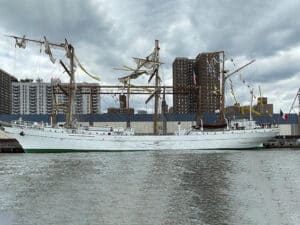
MARAD’s MSP and TSP sealift programs are now fully enrolled
Written by Nick Blenkey
U.S. Transportation Secretary Pete Buttigieg: “In the years ahead, these vessels will delive “After decades of underinvestment, the condition of America’s infrastructure is now finally getting better instead of worse.”
The U.S. Department of Transportation’s Maritime Administration (MARAD) says that its two key sealift programs, the Maritime Security Program (MSP) and the new Tanker Security Program (TSP) are now fully enrolled.
The MSP and TSP sealift programs provide U.S.-flagged and U.S.-crewed ships for U.S. Department of Defense (DoD) sustainment sealift requirements during times of conflict or in other national emergencies and both pay shipowners a retainer for each enrolled vessel.
“In peacetime, our U.S.-flagged commercial fleet serves as a critical link in our supply chain; and in times of war and crisis, it supports military missions around the globe,” said U.S. Transportation Secretary Pete Buttigieg. “In the years ahead, these vessels will deliver vital goods, strengthen both our economy and our national security, and create good jobs for American mariners.”
The newly selected MSP vessels, Liberty Power and Tulane, are operated by Liberty Global Logistics, LLC of Lake Success, N.Y. and Fidelio Limited Partnership of Ponte Vedra Beach, Fla., respectively. The U.S.-flagged Liberty Power is a twelve-year-old roll-on roll-off vessel (RO/RO), with 220,586 square feet of militarily useful cargo capacity. The Tulane, which was previously operated by Wallenius Wilhelsen, is an eleven-year-old RO/RO vessel with 194,665 square feet of militarily useful cargo capacity. It is scheduled to reflag under U.S. registry by the end of this year and will be renamed the Arc Honor.
The final product tanker selected for TSP is the Pyxis Epsilon operated by U.S. Marine Management, LLC of Norfolk, Va. The eight-year-old, 325,000 barrel tanker is scheduled to reflag under U.S. registry by the end of this year and will be renamed the Shenandoah Trader. Back in September, Maroussi, Greece, based Pyxis Tankers Inc. reported that it had agreed to sell the ship “for a sale price of $40.75 million in cash to an unaffiliated buyer located in the United States.”
“MSP and TSP accomplish two key maritime sealift objectives: both grow our U.S.-flagged commercial fleet to benefit the U.S. economy, and both sustain our ability to deliver vital supplies to support military missions across the globe,” said Maritime Administrator Ann Phillips. “MSP has been a success story for the U.S. maritime industry for over 27 years. MSP, together with its sister program TSP, will support U.S. economic competitiveness globally, and ensure U.S. armed forces have unquestioned logistics access anywhere in the world. The award of these three final Operating Agreements will ensure the programs’ continued success and value to the United States.”
The MSP was established in 1996, and now supports a fleet of 60 commercial ships operating internationally. The recently established TSP supports a fleet of 10 commercial product tankers operating internationally and capable of loading, transporting, and storing on-station bulk petroleum refined products to support national economic security and DoD contingency requirements.
“These vessels are pivotal in enhancing global readiness and safeguarding our nation’s supply chains. Both MSP and TSP underscore our steadfast commitment to national security and economic stability and exemplifies the indispensable partnership between MARAD and USTRANSCOM,” said Commander of U.S. Transportation Command, Gen. Jacqueline Van Ovost.
MARAD notes that both programs help address the shortage of both U.S.-flag ships and U.S. Coast Guard-credentialed mariners with unlimited licenses.




